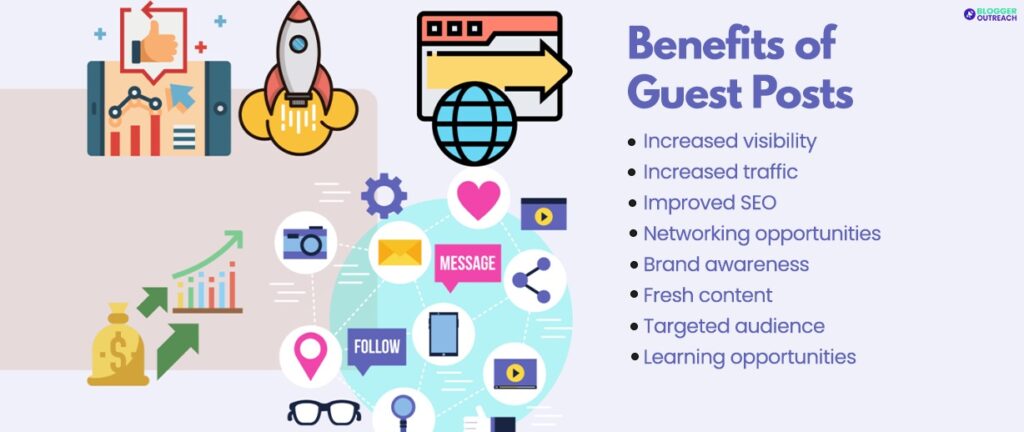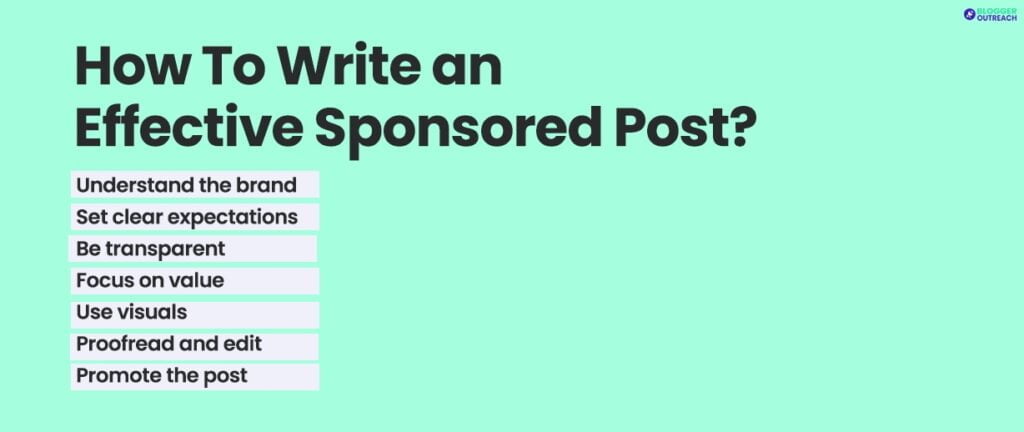When it comes to the differences between guest posts and sponsored posts, everything counts, including:
- The main objective
- Result timeline
- Cost
- Impact of the Outcome
- The author
Let’s be honest with you! This topic is full of misinformation. We, a team of industry experts, are here to set the record straight and educate you.
As your blog becomes more popular and gains authority, you’ll start attracting attention from various sources (competitors, fellow bloggers, freelance writers, and advertisers).
One clear indicator of growth is when you start receiving a flood of comments on your posts (even if some are spam). Moreover, your email inbox will see many requests for guest posts and sponsorships.
We’ve seen a trend lately where some folks pass off sponsored posts as free guest articles when pitching to publishers.
It can be tricky to spot the difference, so how can you determine the difference between guest post and sponsored post?
But it’s important to understand the distinctions to make informed decisions about the content you publish on your website.
By the time you finish reading this article, you’ll have a clear understanding of the basics and will be clear.
So please stick with us for the next few minutes, and let us guide you through the facts and insights you need to know.
Table Of Content
What Are Guest Posts?

Guest post and sponsored post are two different things. Let’s first talk about guest posts.
You write content for someone else’s website or blog in guest posting.
It’s a popular way to increase your online presence and get exposure to new audiences.
Here you contribute your expertise and unique perspective; you can build relationships with other bloggers and readers.
For example, if you’re a fashion blogger, write a guest post for a beauty blog on the latest makeup trends.
Or, if you’re a tech expert, you could write an article for a business website on the benefits of using the latest software.
The key is to provide valuable, engaging content that aligns with the host website’s audience and interests.
In return, you’ll get a byline and often a link back to your website, which can help drive traffic and boost your SEO.
Guest posting is a win-win for both parties, allowing you to showcase your expertise while providing value to the host website’s audience.
Benefits Of Guest Posts

We all have that one friend who stays with us in our time of need. Guest posting is like that friend. It comes with immense benefits. Here are they:
- Increased Visibility: By contributing your expertise and unique perspective to other websites, you can get exposure to new audiences and improve your online visibility.
- Increased Traffic: Guest posting often includes a byline and link back to your website, which can help drive traffic to your site.
- Improved SEO: Backlinks from reputable websites can improve your website’s search engine rankings. This makes your content more accessible.
- Networking Opportunities: Guest posting allows you to build relationships with other bloggers and industry experts, which can lead to new opportunities and collaborations.
- Brand Awareness: Guest posting can help build awareness of your brand and establish you as a thought leader in your industry.
- Fresh Content: Guest posting allows you to produce new, high-quality content that can be shared across multiple platforms, reaching a wider audience.
- Targeted Audience: By choosing websites and blogs that align with your niche or target audience, you can reach a more targeted audience and increase the chances of engaging with potential customers.
- Learning Opportunities: Guest posting can also be a valuable learning experience, as it allows you to see how other bloggers and websites operate and how they create content.
What Are Sponsored Posts?

Sponsored posts and promotion go hand-in-hand.
Sponsored articles are created specifically to promote a brand, product, or service.
The content is paid for by the company or advertiser who wants to get their message out to a wider audience.
The main purpose of sponsored posts is to generate buzz and interest in the product or service being promoted.
These posts can appear on various platforms, including blogs, social media, and online magazines.
Click Here To Read Out Outreach Tips & Strategies
Let’s understand Sponsored Post With Examples
For example, a travel company may sponsor a blog post on a travel blog that showcases their latest vacation package. The post will include a link to the company’s website, encouraging readers to click through and book their next vacation.
Another example could be a fitness brand sponsoring a health and wellness blog post. The post could feature the brand’s latest fitness gear and tips and advice for getting in shape. Again, the post would include a link to the brand’s website, where readers could learn more about the products and make a purchase.
So if you need clarification on guest posts and sponsored posts, with sponsored post you can reach a targeted audience and increase brand awareness.
However, disclosing sponsored posts to readers and followers is important to maintain transparency and trust.
How To Write An Effective Sponsored Post?

Writing guest posts and sponsored posts requires two different approaches.
While writing a sponsored post, you provide valuable content to your audience and promote a product or service.
Here Are Some Steps To Follow When Writing A Sponsored Blog Post:
- Understand the brand: Before you start writing, understand the brand and its values. This will help you align your content with the brand’s message.
- Set clear expectations: You know what the brand expects from you. Are there any specific talking points or keywords that you can add? Are there any restrictions on the tone or style of writing?
- Be transparent: It’s important to disclose that the post is sponsored. This builds trust with your audience and keeps you compliant with legal regulations.
- Focus on value: While promoting a product or service, your main focus should still be providing value to your audience. Make sure the content is informative and engaging.
- Use visuals: Including images or videos can make the post more appealing to readers and help convey the message effectively.
- Proofread and edit: Before publishing, proofread and edit the post for any errors or inconsistencies.
- Promote the post: Once it is live, promote it on social media and other marketing platforms to maximize exposure.
How To Identify Sponsored Post Articles?
To identify sponsored post opportunities cleverly disguised as free guest articles in email, here’s what you can do:
- Scrutinise the outgoing links within the guest post. If any of them direct to a commercial website or service, it may indicate a sponsored post.
- Pay attention to the email address of the sender. If it’s linked to a blog or a common platform like Gmail, it could be a genuine guest post inquiry.
Honest talk: While understanding the distinctions between guest posts and sponsored posts can be beneficial, the ability to differentiate them often comes with experience.
By following these steps and honing your intuition, you can become more adept at identifying sponsored post opportunities masquerading as free guest articles.
How To Differentiate Between A Guest Post And Sponsored Post?
Here are the key factors you need to consider while determining the differences between guest post and sponsored post.
- Author: In a guest post, the content comes from an individual or a company, while in a sponsored post, the content is usually written by the sponsor or the advertiser.
- Payment mode: Guest posts are usually unpaid, while sponsored posts involve payment to the publisher by the sponsor or advertiser.
- The goal of the post: The primary purpose of a guest post is to provide valuable content to the readers of a blog or website. On the other hand, the main purpose of a sponsored post is to promote a product, service, or brand.
- Quick result or long-term result: Guest posts usually have a longer-term impact on the website’s authority and traffic. In contrast, sponsored posts may more immediately impact product or brand promotion.
- Result Impact: Guest posts typically positively affect the website’s search engine rankings, while sponsored posts aim to increase brand awareness or sales.
- Earning Potential: Sponsored posts can be more lucrative for both the publisher and the sponsor, as they involve monetary exchange, while guest posts are usually done to build authority and credibility.
Over To You!
If you are a beginner, identifying the differences between guest post and sponsored post can be challenging.
However, the practices shared above can help you easily spot the nuances between them.
Alternatively, if you feel the need for external guidance, seek help from reputed link-building Services.
Agencies like BloggerOutreach will help you respond to guest post and sponsored post requests.
We Will Guide You On:
- Defining objectives (What to accept and what not to accept).
- What you going to offer.
- Setting your deadlines.
- Creating perfect guest posting guidelines.
- Building relationship.
Sounds great?
If you need further guidance on this, feel free to talk to our outreach experts.
Read More:









